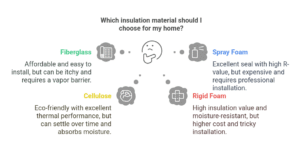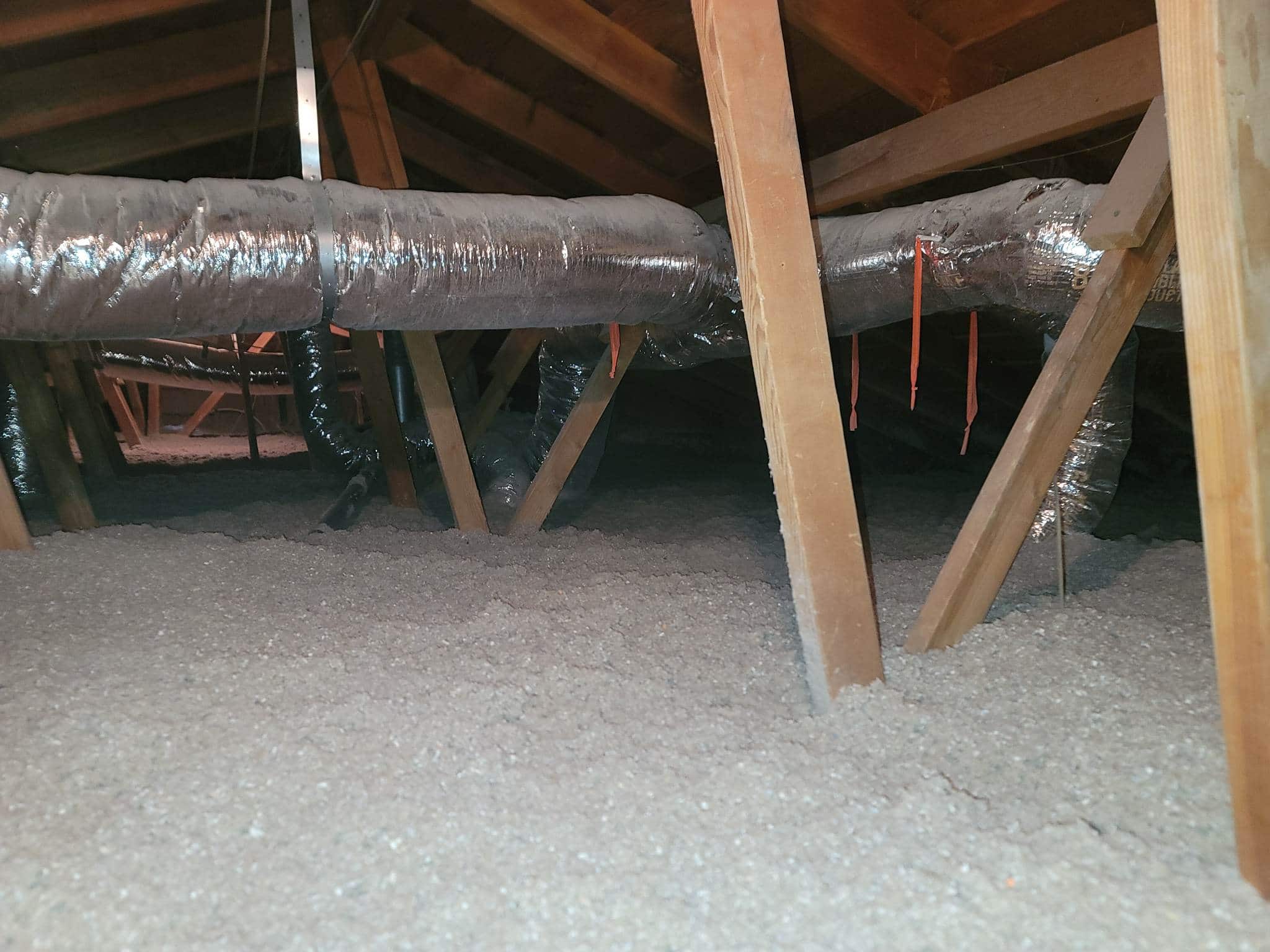Do you wish to keep your house cool in the summer and warm in the winter? Attic wall insulation will do just that. According to research, roughly 25% of a home’s heat is lost through the attic.
If your home does not have sufficient attic wall insulation, you are not only losing heat in the winter but also letting in unwanted heat in the summer. This results in your HVAC system working overtime, leading to increased energy bills and misguided comfort in your home. The silver lining? Installing wall insulation by My Insulation Guy will significantly improve your home’s efficiency and comfort.
In this guide, we will discuss the benefits of attic wall insulation and how it can help you save more energy. So, stay tuned till the end.
How Insulating Attic Walls Can Help?
The insulation of attic walls helps to prevent the transfer of heat during winter and summer. This results in: :
- Decrease energy expenses caused by the HVAC system.
- Improve indoor comfort levels due to optimized temperature control.
- Decrease sound levels by acting as a sound barrier.
- Improve air temperature and quality by filtering pollutants.
- Enhance the market value of property due to the implementation of energy-efficient practices.
- Increase the durability of HVAC systems because their workload has been decreased.
Materials of Wall Insulation for Attics
Different types of materials are used, which have different advantages. Let’s summarise them:

Estimating The Cost For Wall Insulation
The wall insulation cost depends upon the material, labor, and size of the home. The averages are:
Fiberglass: $0.40 – $1.50 per square foot
Spray Foam: $1.50 – $5.00 per square foot
Cellulose Wall Insulation: $0.60 – $2.30 per square foot
Rigid Foam: $1.00 – $3.00 per square foot
Insulation contractors professionally insulate walls and attics, which helps in optimizing the home’s energy efficiency and insulation durability. They evaluate the home and custom-tailor the approach to best suit the client’s needs.
Indicators You May Need to Improve Your Home Insulation
Thinking if it is time to replace your attic insulation? Check these problems first:
- Soaring energy costs.
- Inconsistent temperatures in a room.
- Presence of cold drafts
- Roof ice piles during the winter season.
- Rodents in the attic.
- Moisture buildup and mold appearing.
- Walls are getting hot during summer and cold during winter.
If you spot any of the above issues, then it might be time to invest in wall insulation.
Do It Yourself (DIY) Vs Hiring An Insulation Contractor
Even though some attic insulations can be done as a do-it-yourself project, however hiring a professional guarantees that:
- The right materials are chosen for the job
- Sealing and ventilation are done properly
- Energy is preserved in the long run
- All local building codes are adhered to
- Maximum protection is achieved through optimum R-value performance
- Warrantied installation of insulation
Expert Advice: Take Care of Ventilation
According to energy specialists, proper ventilation is just as critical as insulation. Without proper circulation, moisture can accumulate, resulting in mold growth and damage to buildings. An attic with quality ventilation guarantees that the insulation does its job while fresh air is recirculated.
How Much Insulation Do You Need?
The U.S. Department of Energy has recommended:
- R30 -R49 for warm regions
- R38 – R60 for moderate regions
- R49-R60 for cold regions
These values depend on the amount of insulation in the attic wall and the particular climate zone. Insulation with a higher R-value increases comfort and energy efficiency.
Advantages Of Insulation Beyond Energy Savings
Insulation of the attic wall is more than just saving money. It’s about improving one’s living as a whole. Here’s how it can impact life:
- Improved health: Minimizes dust, allergens, and other pollutants
- Controlled indoor temperatures: Elimination of hot and cold spots
- Carbon footprint neutral: Attainable environmental responsibility
- Reduced noise pollution: Minimized distractions from outdoor noise
- Higher property value: Improves resale opportunities
Extra Tips To Save Energy
Combining attic insulation with other practices helps to save even more money. Some of them are:
- Blocking airflow around windows, doors, and ducts.
- Placing strong windows in order not to lose heat.
- Using thermal curtains to maintain heat during winter.
- Upgrading to smart thermostats for better room control.
Conclusion
Attic wall insulation will have a very positive impact on your home’s comfort and efficiency. Whether you prefer fiberglass, spray foam, or cellulose, an insulation contractor will guide you in making the optimal choice. At My Insulation Guy, our experts offer the best quality of insulation for your home. The materials we use enhance its durability and can be a very cost-efficient option for you. So, without wasting any more time, make your property all weather ready.
For more expert advice and professional guidance on insulation solutions, visit our website or contact us.
FAQs Related to Attic Wall Insulation
- How much does attic wall insulation cost?
Thickness of wall insulation, material, and labor can change the cost. It can range between $0.40 – $5.00 per square foot.
- What’s the best insulation material for attic walls?
Fibreglass insulation is relatively cheap, spray foam gives the best seal, and cellulose is excellent for environment-friendly wall insulation. All of them serve a purpose depending on needs.
- Can I install attic insulation myself?
Yes, but professionals can install it much better, especially for spray foam and rigid foam types.
- How long does attic insulation last?
Majority of materials last around twenty to thirty years at best, but moisture and pests affect its longevity.
- Will attic insulation help with noise reduction?
Of course! Insulation around attics can drastically limit outside noise, improving the home’s silence significantly.

